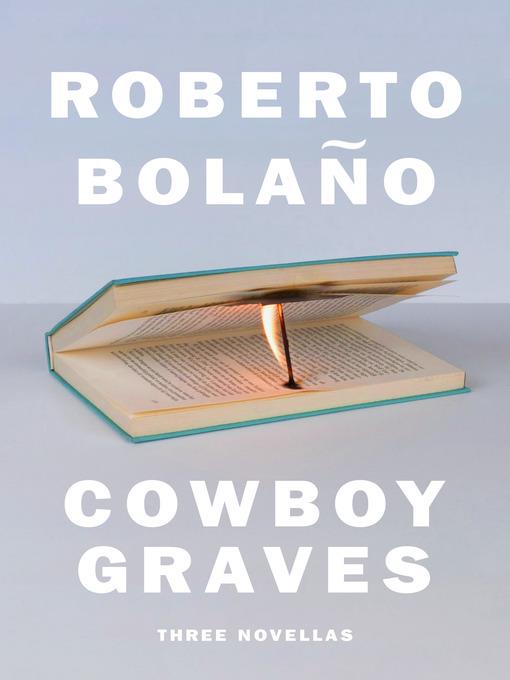
Cowboy Graves
Three Novellas
کتاب های مرتبط
- اطلاعات
- نقد و بررسی
- دیدگاه کاربران
نقد و بررسی

October 19, 2020
An appealing if inchoate episodic collection emerges from Bolaño’s archives (after The Spirit of Science Fiction). In the title novella, Arturo Belano emigrates from Chile to Mexico City at 15 in 1968 to live with his father. There, Arturo befriends a transient man nicknamed the Grub, whom Bolaño fans will remember from Last Evenings on Earth. After the 1973 coup, Arturo returns to Chile to fight on behalf of the leftists. In “French Comedy of Errors,” the book’s most linear story, a French Guianese teenager receives an unexpected call in a phone booth from a group of literally underground writers called the Clandestine Surrealist Group who are waiting to start a revolution. “Fatherland,” narrated by a 20-something Rigoberto Belano who differs only slightly from Arturo, transmutes from an account of Belano’s family and a love affair disrupted by the Chilean coup into fragmentary lectures on a sadistic poet and a mélange of recollected dreams, letters, and detective-style case files. While the loosely connected vignettes in each novella fail to fully cohere, they show a writer working to capture the fragility of identity and relationships in revolutionary settings. These drafts reveal Bolaño (1953–2003) perfecting the literary obsessions that became his emblems.

December 15, 2020
Bola�o's brilliant oeuvre expands with another bright starburst, this one comprising three separate yet thematically connected novellas. ""Cowboy Graves"" follows Arturo Belano, a protagonist familiar to Bola�o fans, as he migrates from Chile to Mexico City and back again to Chile after the military coup in 1973, all of which tracks with the author's own life. ""French Comedy of Horrors"" features an unsuspecting teenager who gets drawn into a shady literary group calling themselves the Clandestine Surrealist Group, an entity reminiscent of the ""visceral realists"" from The Savage Detectives (2007), and modeled after the Infrarealists, founded by Bola�o and other poets in the 1970s. ""Fatherland,"" the third and most experimental section, returns to the Chilean coup through disjointed fragments of lectures, letters, and other documentary entries, centered this time around Rigoberto Belano, a character similar to, but not exactly like, Arturo. Like much of Bola�o's more recent posthumous work, this title's been assembled from a seemingly endless archive of handwritten notes and floppy disks. Even in unfinished works, Bola�o's inimitable style and searing vision will appeal to fans and new readers alike.
COPYRIGHT(2020) Booklist, ALL RIGHTS RESERVED.

December 15, 2020
A posthumous triad of novellas by Bola�o, postmodernist par excellence, late of Chile, Mexico, and Spain. "It's...a novel (like all novels, really) that doesn't begin in the novel, in the book-object that contains it, understand? Its first pages are in some other book, or in a back alley where a crime has been committed." So says a mysterious caller to a young intellectual named Diodorus Pilon in the first novella, French Comedy of Horrors, summoning him to Paris to join the Clandestine Surrealist Group--a group so shadowy that no one quite knows what it is. Will he answer the call? Only Bola�o knows. The title piece is similarly far-flung, with our narrator starting off in Chile, moving north to Mexico, land of those cowboy graves, and then returning to Chile just in time, the chronology suggests, to get caught up in Pinochet's fascist coup of 1973. As ever, the story contains a classic improbability: The narrator, just 15, is an accidental reader of the poet Nicanor Parra and goes off in quest of him while getting ready to leave Chile: "I didn't know where he lived, of course....From the start, I suspected that it would be hard to get there and just as hard to get back." The science fictional, Jesuit-twitting story within the story is vintage Bola�o while Fatherland, the third novella, is especially fragmentary and inconclusive. Set in Concepci�n, along the central Chilean coast, it's a whirl of volcanoes ever about to erupt, of a Nazi fighter that appears in the skies overhead, and of the steady devolution of humankind: "We've progressed from the perfect execution to the concentration camp and the atomic bomb." In an afterword, the Spanish poet Juan Antonio Masoliver R�denas notes that the first and third stories were written in the 1990s and the second in 2002-2003, concurrently with books such as Distant Star and The Savage Detectives and perhaps even part of them at one time, which makes them no less enigmatic. Each story reveals a centrifugal writer with a brilliant command of words and no fear of a plot's getting away from him.
COPYRIGHT(2020) Kirkus Reviews, ALL RIGHTS RESERVED.

























دیدگاه کاربران